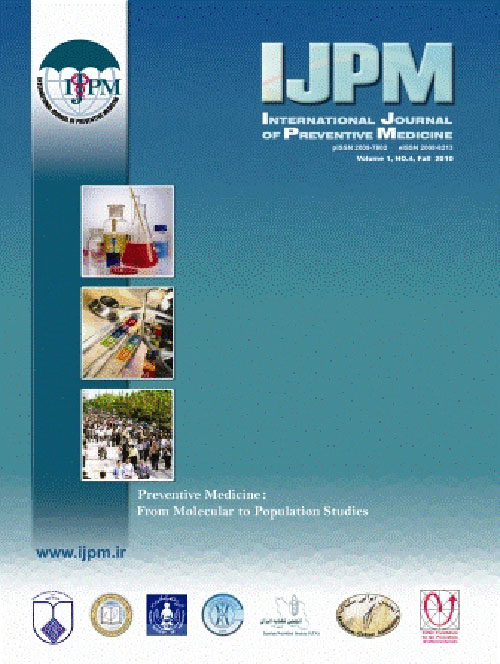فهرست مطالب

International Journal of Preventive Medicine
Volume:7 Issue: 11, Nov 2016
- تاریخ انتشار: 1395/09/28
- تعداد عناوین: 3
-
-
Page 1BackgroundRapid increasing prevalence of diabetes mellitus is a serious health concern in the world. New data determined that the pathogenesis of diabetes mellitus is chronic low‑grade inflammation, resulting insulin resistance. Pomegranate seed oil (PSO) has anti‑inflammatory effects; though it may reduce insulin resistance and improve glycemia in diabetes mellitus. The present study has been designed to investigate the effects of PSO as a natural dietary component on metabolic state of patients with Type 2 diabetes mellitus.MethodsIn a randomized double‑blind clinical trial study, 80 patients (28 men) with Type 2 diabetes were randomly allocated to the intervention and control groups. The intervention group consumed PSO capsules, containing 1000 mg PSO twice daily (2000 mg PSO), whereas controls take placebo for 8 weeks. The participants followed their previous dietary patterns and medication use. Dietary factors and metabolic factors including lipid profile, fasting plasma sugar, and insulin and were assayed at the baseline and after 8 weeks.ResultsParticipants in two intervention and control group were similar regarding anthropometric and the dietary factors at baseline and after trial (P > 0.05). Mean level of total cholesterol, triglyceride, low‑density lipoprotein‑cholesterol, and high‑density lipoprotein was not different significantly between groups after trial (P > 0.05). Consumption of PSO did not significantly affect the levels of parameters such as fasting blood sugar (FBS), insulin, HbA1c, alanine transferase, and homeostasis model assessment‑insulin resistance.ConclusionsConsumption of 2000mg PSO per day for 8 weeks had no effect on FBS, insulin resistance and lipid profile in diabetic patients.Keywords: Diabetes mellitus, insulin resistance, pomegranate seed oil
-
Page 2BackgroundThe aim of this study was to evaluate clients satisfaction regarding health‑care services and its determinant factors in South‑West of Iran.MethodsTotally, 3400 households were randomly selected for this cross‑sectional study, carried out in Shiraz, Iran, from December 2013 to March 2014. Data were collected using a checklist that includes insurance status of the household, enrollment in family physician program, and clients satisfaction level with received health services. The level of statistical significance was set at PResultsThe mean age of the interviewees was 51.71 (±14.01) years, including 2427 (71.4%) females. 9.4% were insured while 72.3% had registered in family physician program. With respect to the family physician and governmental clinics, most subjects were satisfied or very satisfied with distance, time for admission, time spent at the clinic, privacy, and cost. As for private clinics, specialist clinics, and private hospitals, the studied subjects were more dissatisfied with cost but were more satisfied with other items. Living in higher socioeconomic regions (P = 0.001), dissatisfaction with family physician (PConclusionsResults of the present study demonstrated a high level of satisfaction with the health‑care system and family physician in Shiraz, Iran. Moreover, dissatisfaction with family physicians, socioeconomic status, scarcity and cost of drugs, and existing chronic disease(s) were important predictors for dissatisfaction with the health‑care system.Keywords: Delivery of health care, health services, Iran, patient's satisfaction, socioeconomic factors
-
Page 3BackgroundDietary diversity score (DDS) measurement was used to assessment of diet quality in different disease like cardiovascular disease. One way to improve the cardiovascular patient's ability is cardiac rehabilitation program that include exercise training, nutrition consultation and psychological treatment. No study was designed to compare the DDS before and after dietary consultation among cardiac rehabilitation patients, so this study was designed to examine this purpose.MethodsSubjects were participated in the 2-month cardiac rehabilitation program. All patients that completed the cardiac rehabilitation program and 2 dietary records (before and after nutritional counseling in cardiac rehabilitation program) enrolled in study. Kant et al method was used for scoring dietary diversity. Data were analyzed using the statistical package for social sciences (SPSS version 20). Wilcoxon test were used to compare DDS score for each subgroup and pair sample T test was used to compare total DDS after and before nutrition counseling. PResultsThe differences between DDS of grain, fruit, vegetable and meat before and after nutrition counseling were not significant (P = 0.635, P = 0.423, P = 0.826, P = 0.207 respectively), but differences of DDS for dairy and total DDS before and after nutrition counseling were significant (P = 0, P = 0.001).ConclusionsDietary diversity was increased after nutrition counseling among patients with cardiac disease.Keywords: Cardiac rehabilitation, dietary diversity score, nutrition consultation

